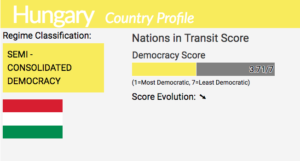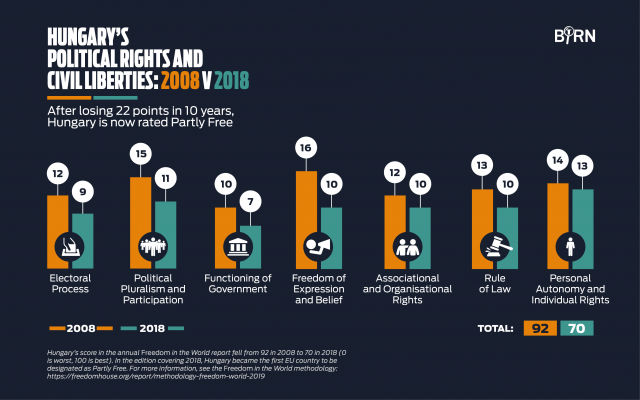
Credit: Visegrad iInsight
Hungarian lawmakers have voted in favour of repealing extraordinary powers granted to Prime Minister Viktor Orban to fight the coronavirus, the BBC reports:
Members of parliament unanimously requested the government lift the state of emergency and Mr Orban’s powers to rule by decree. But opposition groups fear Mr Orban’s administration has greatly expanded its powers amid the outbreak. NGOs critical of Hungary’s leader issued a joint statement saying the vote to remove powers was an “optical illusion” and that the authorities retained greater powers than before the crisis.
Orban now faces the toughest challenge of his rule as the pandemic is expected to push Hungary’s economy, along with much of the world, into recession and drive unemployment higher, Reuters adds.

National Endowment for Democracy (NED)
An analysis by Karoly Eotvos Institute, a democracy watchdog in Budapest, concluded that the legislation approved on Tuesday had no intention of restoring Hungary’s pre-coronavirus legal order, “but rather creates a legal basis for the use of newer extraordinary and unlimited government powers,” The Times reports:
Zoltan Fleck, a director at the institute and a professor at ELTE Faculty of Law in Budapest, said that Mr. Orban’s government had operated outside legal boundaries for many years and now only maintained the veneer of democracy. The use of emergency situations to justify a consolidation of power, he said, has rendered obscure the powers of the legislative and judicial branches.
“There is no place to step back to from here. They have worked very successfully to make permanent the essence of such emergency situations,” Mr. Fleck said.
It becomes clear that transitioning from the state of emergency to a medical crisis does not end Orbán’s rule-by-decree, notes analyst Adam Harangozó. Instead, it extends it indefinitely and removes the last remaining constitutional safeguards, allowing the government to deviate from the constitution in any way it deems necessary, he writes for National Endowment for Democracy (NED) partner Visegrad Insight:
Let us not forget: Fidesz is and will be using narrative strategies of the alt-right to distort the truth, appropriate words, and divert attention by false comparisons. A smoke-and-mirrors “national consultation” has already been launched in Hungary, and the party’s Kremlin-style disinformation sites are spreading virally at the international level.
 “Surrendering rule-by-decree is a great communications ploy by Orban,” said Peter Kreko, managing director of Political Capital, a research institute in Budapest. “In reality it’s just a technical question. The past two months have shown that it’s not the main engine behind Hungary’s increasingly rapid slide toward authoritarianism.”
“Surrendering rule-by-decree is a great communications ploy by Orban,” said Peter Kreko, managing director of Political Capital, a research institute in Budapest. “In reality it’s just a technical question. The past two months have shown that it’s not the main engine behind Hungary’s increasingly rapid slide toward authoritarianism.”
Hungary is the first and only European Union country to be ranked as “partly free” by Freedom House, the U.S. democracy watchdog, and the country ranks among the most corrupt European countries according to an index by Transparency International, an independent advocacy group based in Germany, the Times observes.
“This law is a political declaration, not a legal act,” said Miklos Ligeti, legal director for Transparency International Hungary, likening the process to a “peacock dance.”
“The government can end this on its own; it does not require any parliamentary invitation to do so,” Mr. Ligeti said, referring to the state of emergency. “This is a facade to make it appear more democratic or participatory.”








